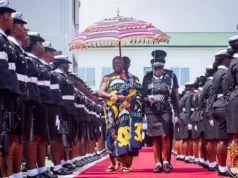There is the saying that “to destroy a people you must first destroy their identity, and the only way to do that is to destroy their culture” and this seems to be the mode of operation employed by the Western world to destroy Africa, creating in the minds of the people that the traditions and culture practiced on the continent is evil to impose their culture on them.
The first method of achieving their objective was through religion, and now through the imposition of democracy, with its associated human rights, which is now delving deep into the cultural l and traditional practices of Africans. A case in question is the alleged marriage of a 16-year-old girl to a 63-year-old priest under Ga tradition and culture.

Whereas some human rights activists have taken a strong stand against the move, others see it as a traditional cultural practice of the people, dating back centuries, and therefore claim that it has nothing to do with any human rights abuse, as believed by those human rights activists. Further clarification by the Ga Traditional Council has explained that the rites performed during the ceremony were to usher the girl into service of the deity, and not for marriage purposes to any priest.
But reacting to the development, the Adontenhene of Agona Asafo, Nana Kwaw Ponsi V, and the minister in charge of the Agona Swedru branch of the Samaria Miracle Church, Apostle Johnson Dzeameshie have advised the human rights activists condemning the tradition as a violation of human rights to take the pain to delve into the issue before coming out to condemn the practice.
According to them, the position those human rights activists turn to denigrate Africa’s rich tradition and culture, however admitting that some practices such as Trokoshie and female genital mutilation are clear practices of violation of human rights, and must be abolished.
They noted that unlike the girl’s issue at hand which has nothing to do with any human rights abuse, some aspects of traditions and culture leave much to be desired, as they infringe on the rights of the people.
















